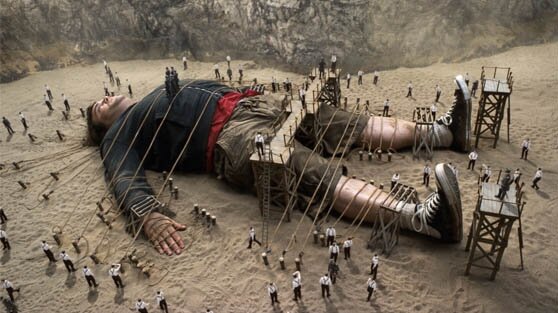Gulliver's Travels is silly as hell and trades more than a bit on Black's School of Rock persona. School of Rock
I may have to stop checking in at Rotten Tomatoes, which gave the movie a pretty low rating: 18 (critics) / 56 (audience). The idea of "professional" movie critics in this internet age is becoming less and less valid to me. So many times the professional reviewer, who must be bored at having to see everything that comes out, from the divine to the ridiculous, seems to lash out purely at the repetition of themes and tropes in movies. This critical frustration with cliché is completely missing the point of why folks most often go to the movies—to relax, have an afternoon or night out, to escape from the house, work, the tube, fill-in-the-blank. To spend a little money, to laugh, to eat and drink overpriced popcorn and soda, to have something to talk about at the water cooler on Monday.
Not all movies could or should be Oscar winners. A movie like Gulliver's Travels is not geared towards a hyper-critical audience, or a movie critic who considers his- or herself sophisticated and dreams of writing for Cahiers du Cinéma. But Gulliver's Travels is for kids and adults who want a laugh. The movie is very much a live-action cartoon, not surprising since its director, Rob Letterman, previously did Shark Tale and Monsters vs. Aliens.
As much as Black's Gulliver uses a little Prince and Kiss and other held-dear-to-his-character's pop culture references to bond with the Lilliputians, the movie isn't just a Jack Black showcase. Emily Blunt, Jason Segel, Amanda Peet, Billy Connolly and Chris O'Dowd all add a little something to the proceedings. O'Dowd is especially good as a General you love to hate, stealing pretty much every scene he appears in. Everyone in the cast goes all out, which is always a good thing in a comedy.

From cutprintreview
There were some subtle little visual details that helped to make the movie more than just a string of jokes. Showing Jack Black's (short) height in an early scene helped to make his transformation to the "giant beast" of Lilliput all the more ironic and fun. The visual cues worked far more effectively than some dialogue foreshadowing in the set-up scenes with Gulliver's newly-apponted boss, “You’re never going to get any bigger than this.” So, the plot is not exactly a Swiftian satire, but details from the original 18th-century text were worked in, and thankfully not overworked—such as Gulliver's taming of the enemy naval fleet, and his visit to Brobdingnag.It is interesting to me that most of the lukewarm reviews (as well as the negative ones) fault Gulliver's Travels for not being, well, Gulliver's Travels (the novel by Jonathan Swift). As classic as Swift's story may be, the fact is that it is being used very loosely to create a modernized vehicle for Jack Black & Co. What sort of movie do these critics think would come out of a more faithful interpretation, and more importantly, would anyone actually want to see such a movie? According to Wikipedia,
Possibly one of the reasons for the book's classic status is that it can be seen as many things to many different people. Broadly, the book has three themes:Our current generation doesn't seem very adept at satire. Attempts to make films about themes like the state of government or religious differences are usually done in a Serious with a capital "S" kind of way, annoyingly Oscar-baiting, and politically correct. A few satirical films come through from time to time, but usually are also the focus of heavy criticism as well, such as Borat
* a satirical view of the state of European government, and of petty differences between religions.
* an inquiry into whether men are inherently corrupt or whether they become corrupted.
* a restatement of the older "ancients versus moderns" controversy previously addressed by Swift in The Battle of the Books.
I tried to read Gulliver's Travels


0 comments:
Post a Comment